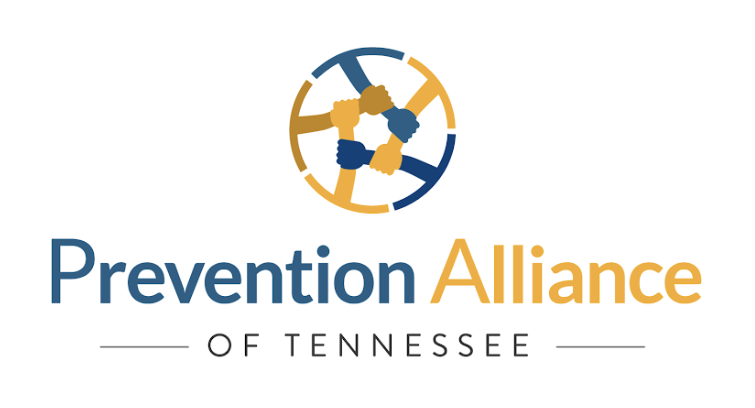The Power of Primary Prevention
THE POWER OF PRIMARY PREVENTION
The Prevention Alliance is a network of over 50 coalitions that fosters collaboration and leverages resources to enhance environmental strategies and targeted statewide services in the fields of substance abuse prevention and public health. PAT Coalitions implement data-driven and evidence-based programs across the state, helping build Tennessee’s capacity to create stronger, healthier communities, families and individuals.
Why are coalitions important?
The work of prevention is greatly advanced when it is coordinated by a locally-developed coalition. By bringing together stakeholders from all sectors to collect and analyze local data to determine the strengths and the needs of their community, coalitions become perfectly positioned for the successful implementation of evidence-based programs that can address the risks faced by Tennesseans. Coalitions utilize a trusted process known as the Strategic Prevention Framework, beginning with a comprehensive community assessment, making data-driven decisions to build capacity around changing and emerging issues. Coalitions are equipped to address problems from the onset and can identify early trends based on comprehensive data assessments. To effectively address local problems, coalitions collaborate to develop and implement customized strategic solutions.
Coalitions demonstrate long-term success in their ability to impact community-wide outcomes. Coalitions that utilize a comprehensive and complimentary set of evidence-based strategies have:
• 44% lower adolescent prevalence of use than communities that do not effectively address substance misuse. • 19% lower adolescent prevalence of use than they did before they received funding to specifically address substance misuse. (DFC National Cross-Site Evaluation, ICF International, 2014)
Coalitions are the community convener.
The prevention coalition model seeks to achieve community-wide outcomes by bringing together a collaborative group of key stakeholders. Diverse representation is one of the primary assets of coalitions.
Primary prevention is cost-effective
A conservative cost-benefit analysis revealed for every $1 invested in primary prevention in Tennessee, there is a $4.60 cost savings. When taken to the county level where coalitions operate, the cost savings increases significantly: the average savings in taxpayer burden spending in local communities in Tennessee where it has been measured is $13.33 (range of $6.92 to $17.73)
(Strutner, S., Harrison, S., Stevenson, W., & Pratt, S. (2015). Assessing Benefits and Costs of Prevention: Utilization of Environmental Strategies to Reduce Substance Abuse and the Burden of Public Spending. Allies for Substance Abuse Prevention, Roane County Anti-Drug Coalition)
INVESTMENT
Additionally, by investing in coalitions, decreases are often also realized among teen pregnancies, truancies, domestic violence, crime, incarceration, child abuse and increasing academic success, community connectivity, healthy families, and economic growth.
How do coalitions operate?
Environmental strategies are based on the belief that substance abuse is a product of multiple environmental conditions and circumstances. These include the norms of the communities in which they live, the accessibility of alcohol, tobacco, and other drugs, the mass media messages to which they are exposed, and the rules and policies of the social institutions to which individuals belong.
Tennessee coalitions implemented 6,294 evidence-based programs and strategies in FY17, including, but not limited to:
• Drug-Free Workplace Training Programs
• Youth and adult substance abuse prevention education and development programs
• SBIRT (Screening Brief Intervention Referral to Treatment) and other Continuing Medical efforts (e.g.: takeback events, permanent disposal bins)
• Education Training for medical providers
• Prescription Drug disposal
• Compliance checks to stop the sale of Alcohol & Tobacco to underage youth
• Community Team Building
• Health Promotion Events (e.g.: back to school event, community event)
• Establishing/Reviewing/Changing Policies - Codes, Ordinances, Regulations, and Laws
• Sobriety Checkpoints and Saturation Patrols
• Media Campaigns (e.g.: Born Drug-Free Tennessee)
• Medication monitoring programs and distribution of free lock boxes
What does it take to be an Effective Prevention Coalition?
Research suggests that effective prevention coalitions impact community-wide changes in targeted health behaviors. There are specific criteria for effectiveness that have been identified as crucial to achieving these community-level impacts.
PROVIDING INFORMATION-ENHANCING SKILLS
• Adopts the public health approach
• Builds capacity around specific issues
• Has long-range, strategic focus on population-level change
• Coordinates data collection and analysis
• Uses data to determine priorities
• Selects evidence-based programs, policies, & practices
• Sets goals and tracks outcomes over time
• Involves diverse community partners, reflective of the community
How you can support TN coalitions?
Be a champion for prevention coalitions that are proactive solutions to achieving positive community outcomes. Establish a long-range plan for investing in effective community coalition practices that includes funding and other resource allocations for:
• Experienced, skilled personnel
• Expert technical assistance, training, and research
• Evidence-based programming, policies, & practices
• Administration of passive consent youth surveys to learn more about the risk and protective factors & anti-social behaviors experienced by our youth.

